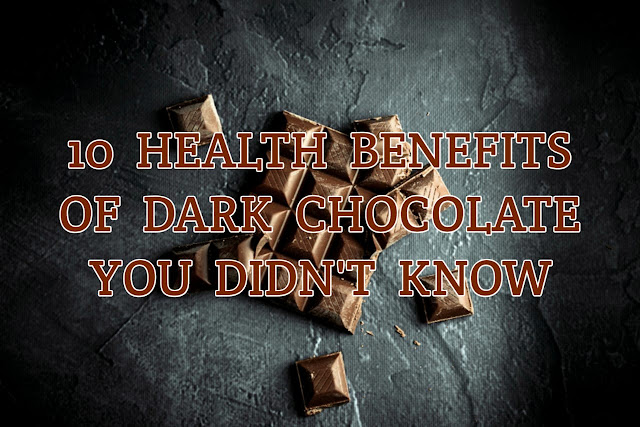10 Health Benefits of Dark Chocolate You Didn't Know

How can something that tastes so rich and decadent be good for you? Well, dark chocolate has been shown to have 10 different health benefits, ranging from enhanced mood and stress reduction to reduced risk of cancer and heart disease. Check out these 10 health benefits of dark chocolate to get the scientific details behind this sweet food’s surprising health benefits. Plus, read on to find out which brands of dark chocolate offer the most nutrients at the best price, so you can incorporate dark chocolate into your diet with even more confidence!
1) Brain function
The benefits of dark chocolate are numerous, and include: improved brain function, reduced risk for obesity, a reduced risk for heart disease, improved blood pressure and cholesterol levels, enhanced mood and sense of well-being. This is just the tip of the iceberg!
Dark chocolate benefits are many and varied. To list a few: dark chocolate can improve your brain function; it can reduce your risk for obesity; it reduces your risk for heart disease; it improves blood pressure and cholesterol levels. And that's just scratching the surface!
2) Blood pressure
Dark chocolate benefits your blood pressure by preventing against hypertension, lowering cholesterol, and reducing the risk of heart disease. High blood pressure can cause a variety of health problems such as strokes and cardiovascular diseases. There are many ways to reduce high blood pressure such as cutting salt intake, managing stress levels, and eating dark chocolate.
3) Cholesterol
Eating dark chocolate can help lower your cholesterol levels by reducing the amount of LDL (bad) cholesterol and triglycerides in your blood. It also raises HDL (good) cholesterol, which is the type that helps keep you healthy. In fact, eating dark chocolate can even raise HDL levels by up to 15%. The same effect isn’t seen from drinking cocoa or milk chocolate, but there are other benefits to eating dark chocolate.
4) Depression
Eating dark chocolate has been linked to reducing feelings of depression. This is because the cocoa and serotonin in dark chocolate work together to increase your mood. However, it's important to note that too much dark chocolate can have a negative effect on your body by causing weight gain or raising blood pressure.
This is why it's best to only eat a small amount each day and make sure it's not adding any pounds on you or causing any other health problems.
It is also important for men who are over 50 years old to be aware that eating too much dark chocolate can lead to an increase in prostate cancer risk- so eat sparingly!
In addition, with the benefits of eating dark chocolate come the drawbacks as well.
5) Diabetes
Diabetes is a disease where your body can't produce insulin, or doesn't make enough insulin to keep your blood sugar levels normal. It's really important to eat dark chocolate because it has been proven to help regulate blood sugar levels in people with diabetes! Plus, when eaten in moderation it can provide a host of other health benefits too!
6) Heart health
Eating dark chocolate can improve your heart health. It may lower the risk of cardiovascular disease and decrease blood pressure. It can also help reduce the risk of stroke and coronary artery disease, both leading causes of death in the United States. Eating dark chocolate is a healthier alternative to sugary snacks or desserts that contain artificial ingredients, sugar alcohols, or preservatives.
1) Lower Risk of Cardiovascular Disease
2) Decreased Blood Pressure
3) Reduced Risk for Stroke
4) Decreased Coronary Artery Disease
5) Rich Source of Antioxidants & Polyphenols
7) Weight
Dark chocolate is rich in antioxidants, which means it can help you lower your risk for heart disease and stroke. It also contains magnesium, which helps lower blood pressure. Plus, dark chocolate has been shown to reduce stress and may even help with weight loss. Studies have found that people who eat dark chocolate tend to eat less than those who don’t indulge. In one study where participants were given a small amount of dark chocolate every day for 15 days, researchers found that they consumed 12% less food than the control group.
8) Skin health
Eating dark chocolate is good for your skin! This delicious treat is high in flavonoids which have been shown to reduce redness and irritation. It also contains antioxidants, which are great at fighting the free radicals that can cause wrinkles. The natural sugar in dark chocolate gives you a burst of energy and can help regulate blood sugar levels, so you're less likely to experience hypoglycemia or hyperglycemia. Plus, eating dark chocolate can be a mood booster and act as an antidepressant when eaten in moderation.
9) Stress
Dark chocolate is a solid choice for those looking to indulge in an unhealthy snack. Here are 10 benefits of dark chocolate you may not have known about:
-Dark chocolate has no sugar, which can help regulate blood sugar levels.
-It's loaded with antioxidants, which can help reduce stress and improve heart health. -The flavanols in dark chocolate can improve cognitive function and memory. -Dark chocolate is full of fiber and magnesium, which helps the body relax and sleep better at night. -Dark chocolate has a low glycemic index that won't spike your blood sugar, making it a healthy choice for diabetics or those with insulin resistance.
10) Improves insulin sensitivity
Dark chocolate is rich in antioxidants, which have been shown to improve insulin sensitivity. In a study published in the Journal of Nutrition, participants were fed either dark chocolate or milk chocolate every day for 30 days. The dark chocolate group showed improved insulin sensitivity levels and lower fasting blood glucose after eating high-glycemic index meals compared to the milk chocolate group.
This could be especially beneficial for men who are at an increased risk of developing diabetes and heart disease as they age.




0 Comments